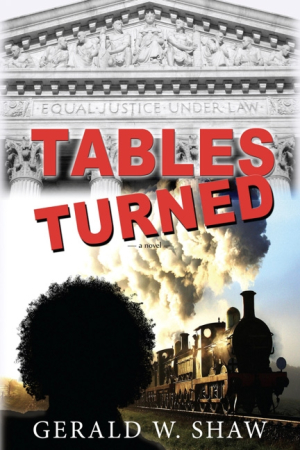Tables Turned
Tables Turned is a historical novel that raises many interesting “what if” questions regarding the fate of the Confederacy and the United States after the Civil War.
In Gerald W. Shaw’s historical novel Tables Turned, a plantation owner and a teacher fight to ensure equality and justice for every American.
As the American Civil War rages, Henry, a Tennessee lawyer and plantation owner, offers to help a visiting teacher, Karen, who’s been accused of spying for the Union. Local landowners disapprove of Henry’s gesture and seek to intimidate him and Karen. Meanwhile, a handful of radical Union politicians plan an extraordinary punishment for the rebel states: former slaveholders will themselves be enslaved to the people they once held in bondage.
Real historical figures and debates form the background of this intriguing alternate history, most notably Representative Thaddeus Stevens’s clashes with the more moderate presidents Abraham Lincoln and Andrew Johnson. Cameo appearances from other famous personalities are entertaining touches.
Many characters exist in a moral gray area, holding both progressive and oppressive views. They are a nuanced and interesting bunch. However, the narrative does not always acknowledge characters’ faults. Henry in particular is painted as a hero who only employs free black workers, stops a slave sale, and helps the Union whenever he can. But Henry’s own history with owning slaves is ambiguous, and he defends a slave-owning friend as a good man. The book presents a paradox: slavery is inexcusable, but only slave traders and physically abusive owners have committed a crime worthy of condemnation.
There are some tantalizing characterizations. The courtroom scene where Karen defends herself against charges of espionage shows off her strength and conviction. Henry’s teenage daughter, Julie, is mature and competent enough to run the plantation on her own when her father is away. But while Karen is a main character, Julie is not. The narrative spends a lot of time introducing another character, Henry’s adopted son, who contributes little to the main story and disappears before the final chapters.
Unnecessary details and speaker tags slow the pace. Spelling errors, a lack of scene breaks, and a confusing timeline are distracting. Racial slurs and sexual threats may be historically accurate, but they are distressing by modern standards. Black characters are depicted in stereotypical and infantilizing ways. Despite narrative emphasis on emancipation and the evils of slavery, black characters’ perspectives are glossed over. Lengthy scenes of travel become tedious, though they lend themselves to intense and intricate glimpses of the war-ravaged South.
Problems are solved with relative ease throughout the narrative, undermining its tension. In the climactic final chapter, Henry presents fascinating arguments before the Supreme Court, but the ending is abrupt and excludes reactions from its key characters.
Tables Turned is a historical novel that raises many interesting “what if” questions regarding the fate of the Confederacy and the United States after the Civil War.
Reviewed by
Eileen Gonzalez
Disclosure: This article is not an endorsement, but a review. The publisher of this book provided free copies of the book and paid a small fee to have their book reviewed by a professional reviewer. Foreword Reviews and Clarion Reviews make no guarantee that the publisher will receive a positive review. Foreword Magazine, Inc. is disclosing this in accordance with the Federal Trade Commission’s 16 CFR, Part 255.

